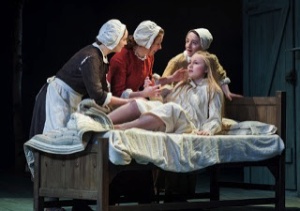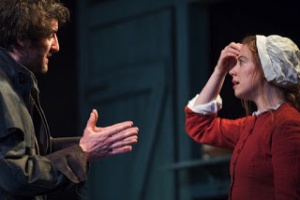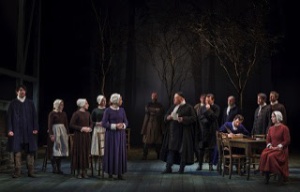by Peter Callaghan
The Salem witch hunts at the heart of Arthur Miller’s timeless classic The Crucible have strong and well-documented connotations to the McCarthy hearings of the 1950s in that on both occasions subversive establishment figures whipped up a climate of fear and hysteria to provoke unfounded allegations against innocent people who were presumed guilty before trial and made to confess thought crimes and unlawful acts of witchcraft and communism – which they did not commit – in order to salvage their good names and in some instances their lives.
 But the modern parallels to child sexual abuse and paedophilia are equally strong. Yes, public figures like the one-time national treasure Rolf Harris and the Lostprophets frontman Ian Watkins deserve to languish in jail for the despicable crimes they committed against vulnerable young children. But what of the radio and television presenter Paul Gambaccini and the Coronation Street actor Bill Roache who for months on end had their private lives and public reputations dragged through the mud and sensationalised in far from objective tabloid headlines – despite being proven innocent?
But the modern parallels to child sexual abuse and paedophilia are equally strong. Yes, public figures like the one-time national treasure Rolf Harris and the Lostprophets frontman Ian Watkins deserve to languish in jail for the despicable crimes they committed against vulnerable young children. But what of the radio and television presenter Paul Gambaccini and the Coronation Street actor Bill Roache who for months on end had their private lives and public reputations dragged through the mud and sensationalised in far from objective tabloid headlines – despite being proven innocent?
And, even more worryingly, what about the numerous ordinary men and women who have been hounded from their homes, shunned by their families and communities, beaten up and taunted on the back of gossip and false allegations whipped up on social media sites like Twitter and Facebook? Their good names have been irreparably damaged and in some instances their lives have been lost. As John Proctor said after hearing that his wife Elizabeth had been arrested on suspicion of witchcraft: “now the little crazy children are jangling the keys of the kingdom, and common vengeance writes the law!”
 John Dove, who completes both his and the Lyceum’s twelve-year long celebration of Arthur Miller’s most famous works which included powerful and handsome productions of All My Sons, Death of a Salesman, The Price and A View from the Bridge, once again takes up the directorial reins to stage what Brooks Atkinson, the esteemed theatre critic of the New York Times who oversaw the original 1953 Broadway production, described as “a powerful drama” but in comparison to Death of a Salesman “is not of that stature and it lacks that universality”. A charge I would apply to this production which although equally powerful and drawing fine performances from its 19-strong cast is let down by a turgid first act which lacks dramatic tension and genuine emotion.
John Dove, who completes both his and the Lyceum’s twelve-year long celebration of Arthur Miller’s most famous works which included powerful and handsome productions of All My Sons, Death of a Salesman, The Price and A View from the Bridge, once again takes up the directorial reins to stage what Brooks Atkinson, the esteemed theatre critic of the New York Times who oversaw the original 1953 Broadway production, described as “a powerful drama” but in comparison to Death of a Salesman “is not of that stature and it lacks that universality”. A charge I would apply to this production which although equally powerful and drawing fine performances from its 19-strong cast is let down by a turgid first act which lacks dramatic tension and genuine emotion.
Framed within a simple wooden structure of beams and posts, with nothing but a long table, a narrow bed and a handful of hard-backed chairs warmed by the faint glow from a dying hearth, Michael Taylor’s sparse set design drills the attention to the words and the actions on stage with only a backdrop of barren trees engulfed in mist to suggest the fear and suspicion about to be generated by the dark arts at play. And play and pretence, fuelled by what John Proctor calls “a whore’s vengeance”, is what leads to the hysteria which tarnished the reputation and claimed the lives of innocent men and women who were hanged and crushed on the chest by stones.
 When his wife Elizabeth (an excellent Irene Allan) is taken ill after childbirth, the farmer John Proctor (whose everyman qualities of honesty and honour are subtly brought to the fore by Philip Cairns) turns to their maid Abigail Williams (a mischievous Meghan Tyler) for comfort. The exact nature of their tryst is kept deliberately vague – Abigail claims that he “clutched my back” behind the house and “sweated like a stallion” in her presence, whereas Proctor simply stated that he “lusted” and thought of her “softly from time to time” – but when Elizabeth recovered she “came to think he fancied her” and so dismissed Abigail from the house. And what started off as fits and faints following a juvenile attempt to summon the dead, descended into gossip-mongering, finger-wagging, score-settling and full-blown witch hunts fuelled by “a whore’s vengeance”.
When his wife Elizabeth (an excellent Irene Allan) is taken ill after childbirth, the farmer John Proctor (whose everyman qualities of honesty and honour are subtly brought to the fore by Philip Cairns) turns to their maid Abigail Williams (a mischievous Meghan Tyler) for comfort. The exact nature of their tryst is kept deliberately vague – Abigail claims that he “clutched my back” behind the house and “sweated like a stallion” in her presence, whereas Proctor simply stated that he “lusted” and thought of her “softly from time to time” – but when Elizabeth recovered she “came to think he fancied her” and so dismissed Abigail from the house. And what started off as fits and faints following a juvenile attempt to summon the dead, descended into gossip-mongering, finger-wagging, score-settling and full-blown witch hunts fuelled by “a whore’s vengeance”.
But for the first act which is sapped of energy and emotion and full of unnecessary chess-like manoeuvres from one chair to another (often the long way round the table or bed, when a few steps via the shortest route would have sufficed), and despite some of the actors’ voices sounding strained or failing to match their stature or the physicality of their performances, by and large John Dove’s stripped-back production is a fitting end to the Lyceum’s Arthur Miller celebration and a riveting two and a half hours of traffic on the stage.
The jewels in the crown being Irene Allan and Philip Cairns as Elizabeth and John Proctor, as well as David Beames and Richard Conlon as Giles Corey and Reverend Hale, whose performances bring a much needed light and shade (and in respect to David Beames humour) to an otherwise dry and cerebral production. As Brooks Atkinson said, The Crucible may not be Death of a Salesman, but it still packs a powerful punch and its timeless theme of damaged reputations brought down by false allegations whipped up by a climate of hysteria and fear are as relevant now as ever.
Director: John Dove
Set: Michael Taylor Lights: Tim Mitchell Sound: Philip Pinsky
Cast: Philip Cairns, Irene Allan, Meghan Tyler, Richard Conlon,
David Beames, Greg Powrie, Ron Donachie, Mark McDonnell,
Kirsty Mackay, Douglas Russell, Isabella Jarrett, Joanna Tope,
Robert Jack, Anne Odeke, Dan Travis, Kirsty MacLaren
Venue: Lyceum, Edinburgh Dates: 16 Feb to 19 Mar 2016
- REVIEW: Orphans @ Edinburgh King’s Theatre ⭐⭐⭐⭐ - 13th April 2022
- REVIEW: Everybody’s Talking About Jamie @ Edinburgh Festival Theatre ⭐⭐⭐⭐ - 30th March 2022
- REVIEW: Sheila’s Island @ Edinburgh King’s Theatre - 2nd March 2022










